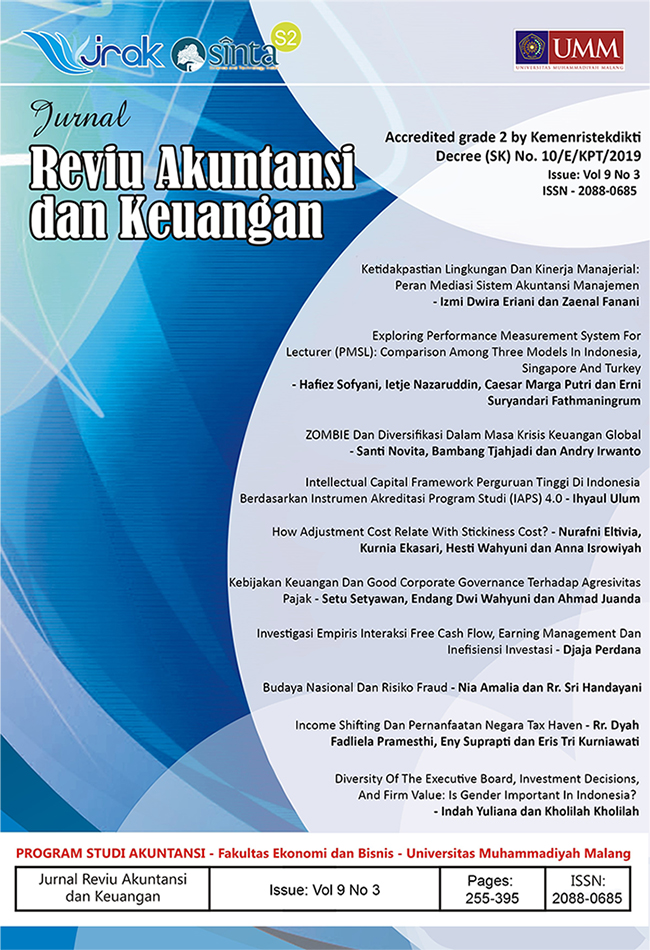EXPLORING PERFORMANCE MEASUREMENT SYSTEM FOR LECTURER (PMSL): COMPARISON AMONG THREE MODELS IN INDONESIA, SINGAPORE AND TURKEY
DOI:
https://doi.org/10.22219/jrak.v9i3.9639Keywords:
Performance Measurement System, Lecturer, University, Global AchievementAbstract
This study aims at exploring the Performance Measurement System for Lecturer (PMSL) through a comparison study in three countries, namely Indonesia (MY), Singapore (IT), and Turkey (IMU). We uses multiple case study approach by conducting a comparative study. The data are obtained mainly using interview. Those lecturers assuming some offices and play some roles in formulating the lecturer performance policy are chosen to be this study’s informants, they are: Management and Organization Chair, Chairman of the university senate, Vice Rector for Academic Affair, and Member of Information Systems Audit Control. The results reveal that there are different PMSL patterns from the three research objects, i.e. MY (Indonesia), IT (Singapore) and IMU (Turkey). MY have fairly aggressive PMSL policy as compared to the other two campuses since they have to work harder to improve the performance of their lecturers who in this case have relatively lesser academic experiences at international level. MY reward special incentives for certain performance target and hold a science camp mentoring to improve their lecturers’ capabilities. Meanwhile, IT perform PMSL by classifying lecturer’s performance measurement into two tracks, namely teaching and research tracks. This makes lecturers more focused on and satisfied with their job, and eventually leads to an optimal performance level. Additionally, at IMU Turkey, to achieve lecturer optimal performance, the university prepares a policy related to three aspects: pedagogic (mentoring), knowledge management, and administration easiness. This research result is expected to give real contribution to the refinement of PMSL policy model at universities in Indonesia to allow it to trigger globally-competitive lecturer performance improvement (Global Achievement). This study explains how PMSL as a derivative of goal setting theory is effectively successfully implemented at a University in three different countries which in this case have different organizational cultures.
Downloads
Downloads
Published
Issue
Section
License

Jurnal Reviu Akuntansi dan Keuangan is licensed under a Creative Commons Attribution-NonCommercial-ShareAlike 4.0 International License.
Authors who publish with this journal agree to the following terms:
- Authors retain copyright and grant the journal right of first publication with the work simultaneously licensed under a Creative Commons Attribution-NonCommercial-ShareAlike 4.0 International License that allows others to share the work with an acknowledgement of the work's authorship and initial publication in this journal.
- Authors are able to enter into separate, additional contractual arrangements for the non-exclusive distribution of the journal's published version of the work (e.g., post it to an institutional repository or publish it in a book), with an acknowledgement of its initial publication in this journal.
- Authors are permitted and encouraged to post their work online (e.g., in institutional repositories or on their website) prior to and during the submission process, as it can lead to productive exchanges, as well as earlier and greater citation of published work (See The Effect of Open Access).










